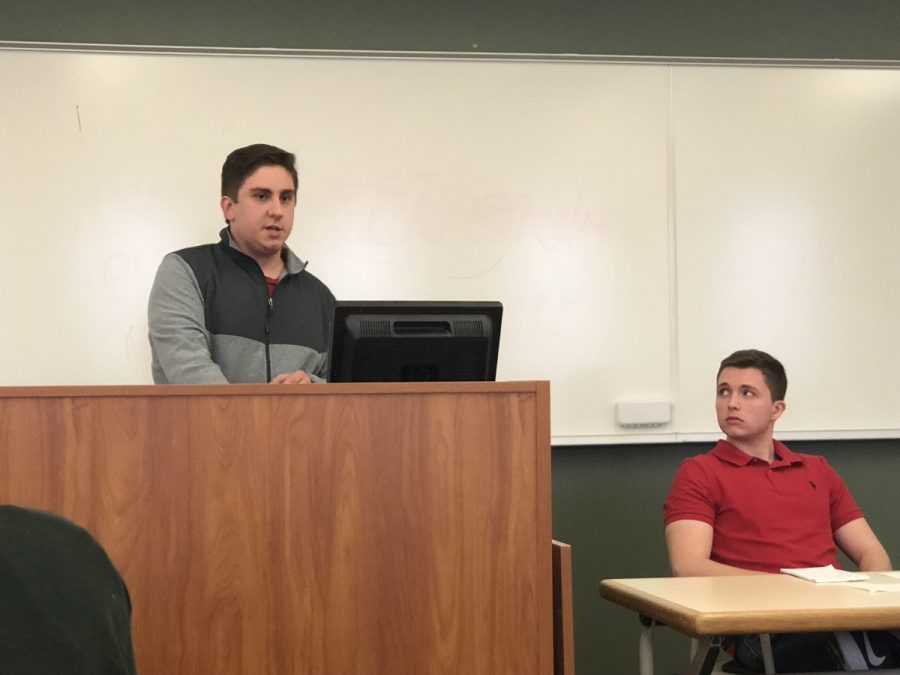Culver Fellows debate convention of states to amend US Constitution
April 12, 2018
Two freshmen presented opposing viewpoints at a Pizza and Policy discussion on April 5, regarding a theoretical convention of the states to amend the U.S. Constitution.
An audience of about 20 students gathered in the Pioneer Conference Room to eat pizza and hear arguments from Grant Zajicek and Andrew Dunn. The freshmen are both fellows of the Simpson College John C. Culver Center, which hosted the event.
Zajicek spoke first and presented his case for why the U.S. should amend the Constitution by holding a convention of the states.
He first pointed out the main problems he saw with the U.S. federal government such as the growing national debt, politicians who don’t follow through on their promises, the passage of unconstitutional legislation and a Supreme Court which interprets the Constitution to meet its members’ own political agendas.
“So, we have all these problems with the federal government, but there is a solution: That is a convention of the states,” said Zajicek.
There are two ways to amend the Constitution, he explained. The first method involves two-thirds of both houses of the U.S. Congress proposing and passing an amendment which would then be sent to the state legislatures. At least three-fourths of the states would need to ratify it for it to become part of the Constitution.
“That is the way all of our amendments, all 27 amendments, have been adopted to our Constitution,” he said.
The second method, a convention of the states, would go around Congress by having at least two-thirds of state legislatures submit an application to Congress to call a convention of states. At the convention, state commissioners would propose, debate and vote on a potential amendment, which would require three-fourths of the state legislatures to ratify it in order to pass.
By originating with the state legislatures instead of with the U.S. Congress, Zajicek said a convention of states would place limits on Congress that it wouldn’t place on itself. He said this check on Congress’ power is beneficial in the event that the federal government becomes oppressive.
Zajicek said if such a convention were to be held, a possible constitutional amendment he would support would be one that imposes term limits on members of both houses of Congress.
“I personally don’t believe that there should be senators that are in Congress 20 to 30 years,” Zajicek said. “This breeds corruption and that D.C. swamp that we hear about all the time.”
He said he would also support an amendment to require Congress to pass a balanced budget, place term limits on members of the U.S. Supreme Court and restrict the Court’s capacity for judicial review. He said the latter would prevent the Supreme Court from reinterpreting the Constitution “beyond what the framers intended.”
Dunn disagreed with Zajicek’s position, saying a convention of states would be, “really bad for our country. I think it has the potential to set a dangerous precedent for our democracy.”
Dunn first pointed out that Article V, which is the part of the Constitution that talks about a convention of the states, does not lay out a framework or limitations for how a convention would work. Dunn said this lack of specifics means “there is a lot of potential for bad things to happen.”
For example, Dunn said Article V does not specify who would be required to attend the convention or a process by which amendments would be proposed by the states in order to even be considered. He also said a convention of states could potentially allow for extreme measures to be proposed, such as a repeal of the Second Amendment.
Dunn also said he opposed an amendment calling for congressional term limits, saying the frequent change of lawmakers in office would lead to inconsistency in the lawmaking process.
“We have to have consistency with our laws,” he said.
Dunn argued that term limits would neglect the chance for voters to choose their preferred candidate and would also prevent lawmakers from gaining experience needed to do their jobs effectively. He said it would also remove experienced and effective lawmakers from office.
“Congress is messed up. There are some good people,” Dunn said. “Do they deserve to be thrown out for the bad apples? No.”
Seth Andersen, director of the Culver Center, said the idea for this forum discussion originated from a law that’s been moving through the Iowa Senate this year.
According to a Des Moines Register article from January, “Senate Joint Resolution 8 is intended to call a convention of states that would impose fiscal restraints, limit the power and jurisdiction of the federal government, and to ask Congress to propose similar amendments.”
The article says the idea to call a convention of states in order to restrict the federal government is popular with many prominent conservative politicians, television hosts and business owners.
At the end of the discussion, Andersen asked both speakers if a constitutional amendment was necessary to clarify how a convention of the states should function. Dunn said yes, and Zajicek said he believes the process is clear enough already.







